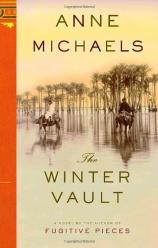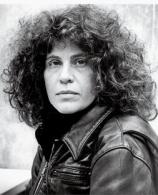Excerpt
Excerpt
The Winter Vault

Generators floodlit the temple. A scene of ghastly devastation. Bodies lay exposed, limbs strewn at hideous angles. Each king was decapitated, each privileged neck sliced by diamond- edged handsaws, their proud torsos dismembered by chainsaws, line-drilling, and wire-cutting. The wide stone foreheads were reinforced by steel bars and a mortar of epoxy resin. Avery watched men vanish in the fold of a regal ear, lose a shoe in a royal nostril, fall asleep in the shade of an imperial pout.
The labourers worked for eight hours, dividing the day into three shifts. At night, Avery sat on the deck of the houseboat and re-calculated the increasing tension in the remaining rock, re-evaluated the wisdom of each cut, the zones of weakness and new stress forces as, tonne by tonne, the temple disappeared.
Even in his bed on the river, he saw the severed heads, the limbless minions, stacked and neatly numbered in the floodlights, awaiting transport. One thousand and forty-two sandstone blocks, the smallest weighing twenty tonnes. The miraculous stone ceiling, where birds flew among the stars, lay dismantled, out in the open, below real stars, the real blackness beyond the floodlights so intense it seemed to be coming apart, like wet paper. The workers had first attacked the surrounding rock, a hundred thousand cubic metres carefully plotted, labelled, and removed by pneumatics. And soon, the building of artificial hills.
To free himself from the noise of machinery, Avery listened for the river flowing past their bed, his head against the hull. He imagined, clinging to the dark wind, the steady breath of glass-blowers in the city five hundred kilometres north, the calls of water-sellers and soft-drink vendors, the shrieking of kingfishers through the surf of ancient palms, each sound evaporating into the desert air where it was never quite erased.
The Nile had already been strangled at Sadd el Aali, and its magnificent flow had been rerouted before that, to increase the output of Delta cotton, to boost the productivity of the unimaginably distant Lancashire mills.
Avery knew that a river that has been barraged is not the same river. Not the same shore, nor even the same water.
And although the angle of sunrise into the Great Temple would be the same and the same sun would enter the sanctuary at dawn, Avery knew that once the last temple stone had been cut and hoisted sixty metres higher, each block replaced, each seam filled with sand so there was not a grain of space between the blocks to reveal where they’d been sliced, each kingly visage slotted into place, that the perfection of the illusion --- the perfection itself --- would be the betrayal.
If one could be fooled into believing he stood in the original site, by then subsumed by the waters of the dam, then everything about the temple would have become a deceit.
And when at last --- after four and a half years of overwork, of illness caused by extremities of heat and cold, or by the constant dread of miscalculation --- when he stood at last with the Ministers of Culture, the fifty ambassadors, his fellow engineers, and seventeen hundred labourers to gape at their achievement, he feared he might break down, not with triumph or exhaustion, but with shame.
Only his wife understood: that somehow holiness was escaping under their drills, was being pumped away in the continuous draining of groundwater, would soon be crushed under the huge cement domes; that by the time Abu Simbel was finally re-erected, it would no longer be a temple.
The river moved, slow and alive, through the sand, a blue vein along a pallid forearm, flowing from wrist to elbow. Avery’s desk was on deck; when he worked late, Jean woke and came to him. He stood up, and she didn’t let go, hanging from her own embrace.
Calculate me, she said.
At dusk, the light was a fine powder, a gold dust settling on the surface of the Nile. As Avery took out his paints from the wooden box, thick cakes of solid watercolour, his wife lay down on the still-warm deck. Ceremoniously, he parted her cotton shirt from her shoulders, each time witnessing her body’s colour deepening: sandstone, terra cotta, ochre. A glimpse of the secret white stripes under straps, the pale ovals like dampness under stones, untouched by the sun. The secret paleness he would later touch in the dark. Then Jean peeled her sleeves from her arms and turned on her side, her back to him, in the velvet light. The light of darkness, more evening than day.
Avery leaned overboard, dipped his teacup into the river, then set the circle of water next to him. He chose a colour and let it seep into the soft hair of the brush, infused with river water. Gently he released its fullness across Jean’s strong back. Sometimes he painted the scene before them, the riverbank, the ruinous work that never stopped, the growing pile of stone physiognomy. Sometimes he painted from memory, the Chiltern Hills, until he could smell his mother’s lavender soap in the fading heat. He painted, beginning from childhood, until he was again man-grown. Then, almost the moment he finished, he dipped the cup again into the river and with clear water drew his wet brush through the fields, through the trees, until the scene dissolved, awash on her skin. Some of the paint remained in her pores, until she bathed, the Egyptian river receiving the last earth of Buckinghamshire in its erasing embrace. Of course, Jean never saw his landscapes and, blind, was free to imagine any scene she wished. He would come to think of his wife’s languor during that dusk hour --- each dusk those months of 1964 --- as a kind of wedding gift to him; and in turn, she felt herself open under the brush, as if he were tracing a current under her skin. In this dusk hour, each gave to the other a secret landscape. In each, a new privacy opened. Every evening that first year of their marriage Avery contemplated Buckinghamshire, his mother’s smell, the distance of time from the wet beech forest to this desert, stress points, fissures and elasticity, the pressure map of the soon-to-be-constructed concrete domes, and the heavy mortal beauty of his wife, whose body he was only beginning to know. He thought about the Pharaoh Ramses, whose body above his knees had recently vanished and now lay scattered in the sand, stored in a separate area from the limbs of his wife and daughters. It would be many months before they would be reunited, a family that had not been separated for more than thirty-two hundred years.
He thought that only love teaches a man his death, that it is in the solitude of love that we learn to drown.
When Avery lay next to his wife, waiting for sleep, listening to the river, it was as if the whole long Nile was their bed. Each night he floated down from Alexandria, through the delta of date palms, past isolated dahabiyah, with their loose sails, beached on the banks. Each night before sleep, to dispel the day’s equations and graphs, he made this journey in his mind. Sometimes, if Jean was awake, he spoke the journey aloud until he felt her drift into that state of near sleep when one still believes one is awake, hearing nothing. But Avery would continue to whisper to her nonetheless, elaborating the journey with a hundred details, in gratitude for the weight of her thigh across his. The river, he felt, heard every word, wove every sigh into itself, until it was filled with dreaming, swelled with the last breath of kings, with the hard breathing of labourers from three thousand years ago to that very moment. He spoke to the river, and he listened to the river, his hand on his wife in the place their child would some day open her, where his mouth had already so often spoken her, as if he could take the child’s name into his mouth from her body. Rebecca, Cleopatra, Sarah, and all the desert women who knew the value of water.
While he painted her back, Jean remembered the first time --- in the cinema in Morrisburg --- that they’d sat together in the dark. Avery had touched her nowhere but her wrist, where the small veins gather. She felt the pressure move along her arm, his fingertips still touching only an inch of her, and she decided. Later, in the bright foyer she was exposed, in invisible disarray; he had crawled a slow fuse under her clothes. And she knew for the first time that someone can wire your skin in a single evening, and that love arrives not by accumulating to a moment, like a drop of water focused on the tip of a branch --- it is not the moment of bringing your whole life to another --- but rather, it is everything you leave behind. At that moment.
Even that night, the night he touched one inch of her in the dark, how simply Avery seemed to accept the facts --- that they were on the edge of lifelong happiness and, therefore, inescapable sorrow. It was as if, long ago, a part of him had broken off inside, and now finally, he recognized the dangerous fragment that had been floating in his system, causing him intermittent pain over the years. As if
he could now say of that ache: “Ah. It was you.”
-
Avery was often lost, thinking through the mathematics by which a temple defines its space, attempting to enclose no less than sacredness. Constructing a plane where heaven meets earth. Jean argued that this meeting best takes place out in the open, and that the true plane where the divine vertical pierces this world is simply in the upright posture of a man. But for Avery, the body was one thing and the shaping of space --- the human calculation of space to receive spirits --- quite another.
– But we shape our inner space too, argued Jean. We are making up our minds and changing our minds all the time. And if we believe, I think it’s because we choose to.
– Of course, said Avery, but the body is given to us. We arrive . . . prefabricated. A temple was the first power station. Think of the formulas invented, the physical achievement of thousands of men moving a mountain, hewing and hauling stone tonne by tonne, often hundreds of kilometres, to a site of precise coordinates --- all in an attempt to capture spirits.
To define space, Avery continued, and then he stopped. No. Not to give shape to space, but to give shape to . . . emptiness.
At this, Jean grew fond and took her husband’s hand. From the deck of the houseboat, they watched as workers disappeared into the newly fitted steel culvert that ran from Ramses’ feet into the inner rooms of the Great Temple. The culvert burrowed its way through five thousand truckloads of sand, which had been transported from the desert to protect the facades and to provide lateral support for the cliffside. A century before, it had taken the discoverer of Abu Simbel, Giovanni Belzoni, many days to dig his way down through drifted dunes to the temple; now Avery and his men had reburied it.
– You’re like a man seen from a distance, said Jean, a man who we think has stopped to tie his shoelaces but who is really kneeling in prayer.
– Our shoelaces have to come undone, said Avery, before we ever think to kneel.
Excerpted from The Winter Vault © Copyright 2012 by Anne Michaels. Reprinted with permission by Vintage. All rights reserved.
The Winter Vault
- hardcover: 352 pages
- Publisher: Knopf
- ISBN-10: 0307270823
- ISBN-13: 9780307270825



